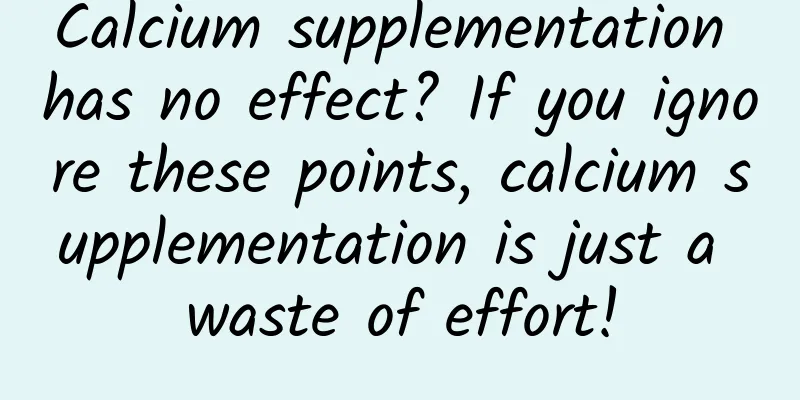Calcium supplementation has no effect? If you ignore these points, calcium supplementation is just a waste of effort!

|
Calcium is an essential element for the human body and plays an important role in blood coagulation, hemostasis, muscle movement, bone structure, etc. The "Dietary Guidelines for Chinese Residents" recommends that the average adult consume 800 mg of calcium per day, while according to the "Guidelines for Primary Osteoporosis Treatment at the Primary Level", the daily dietary calcium intake of Chinese residents is ≤400 mg, and calcium intake is generally insufficient. In real life, many people take calcium supplements in vain, resulting in the supplemented calcium not being effectively absorbed. If you want to take calcium supplements efficiently, you must avoid these misunderstandings. Calcium supplementation: don’t fall into five major misunderstandings Myth 1: Calcium supplementation is only for the elderly A person's bone calcium begins to accumulate after birth, reaches its peak at around 30 years old, and then goes downhill. As we age, bone calcium gradually loses. Not only the elderly need calcium supplements, but also children, pregnant women, and young people. Especially after menopause, women lose bone mass faster. If you do not pay attention to calcium supplements, the risk of osteoporosis will increase. It can be said that calcium supplementation is a lifelong thing. Myth 2: Calcium supplementation is enough Vitamin D and calcium are a good pair. Vitamin D plays a key role in the absorption and utilization of calcium. It helps the intestines absorb calcium and promotes the transport of calcium to bone tissue, thereby maintaining bone health. Vitamin D deficiency can also lead to insufficient calcium absorption. In order for calcium to work, it is not enough to just supplement vitamin D. It requires the synergistic effect of multiple minerals in the human body. Magnesium plays a role in maintaining normal mineral metabolism in bones. Manganese is related to the differentiation of bone cells and the synthesis of collagen. Zinc can promote the proliferation of bone cells and accelerate the calcification of bone cells. Copper can enhance the activity of bone cells and promote the formation of new bones. Supplementing calcium, magnesium, manganese, zinc, copper, and vitamin D together is the key to having healthy bones. Myth 3: Calcium supplementation can cause kidney stones During the calcium supplementation process, the excess unabsorbed calcium in the intestine combines with the oxalic acid component in the food to form unabsorbed calcium oxalate, which is directly excreted from the body, preventing oxalic acid from being absorbed by the intestine, thereby reducing the oxalic acid concentration in the body and reducing the risk of calcium oxalate kidney stones. Therefore, reasonable calcium supplementation will not only prevent kidney stones, but also prevent kidney stones from forming. Myth 4: Liquid calcium is easier to absorb than solid calcium Whether it is liquid calcium or solid calcium, they are just different forms of calcium supplements, and the dosage form has nothing to do with the absorption rate of calcium. Myth 5: Drinking more bone soup and dried shrimps can supplement calcium The main ingredients of bone broth are water and fat. The calcium content is very low, less than one percent of that in milk. Moreover, the fat and purine content in repeatedly boiled bone broth is high, so drinking too much is actually bad for your health. The calcium content of shrimp skin is as high as 991 mg/100 g, which is nearly ten times that of milk. However, the dietary fiber in shrimp skin can form an insoluble complex with calcium, reducing the absorption of calcium, resulting in poor absorption rate. In addition, the sodium content of dried shrimp is as high as 5057.7 mg/100 g. To obtain the same calcium content as a 200 g pack of milk, you need to eat 18.4 g of dried shrimp, and you will also take in 930 mg of sodium, which is equivalent to nearly 2.4 g of salt. The "Dietary Guidelines for Chinese Residents" recommends that the daily salt intake should be less than 5 g. Eating dried shrimp to supplement calcium can easily lead to excessive salt intake. Remember these key points when supplementing calcium! Nutritional intake There are many foods in our daily diet that are rich in calcium, such as soy products such as brine tofu and gypsum tofu, seafood such as fish, shrimp and shellfish, and dark green vegetables such as shepherd's purse, spinach, leek, lettuce, and broccoli. If you don't eat enough food, you can supplement the calcium your body needs through nutritional supplements. In addition to calcium, you should also pay attention to the intake of nutrients such as vitamin D, vitamin K, protein, and vitamin C. Vitamin D: plays an important role in promoting calcium absorption and bone mineralization. There is little vitamin D in food, and many people wear sunscreen in summer, which will affect the synthesis of vitamin D in the body and lead to vitamin D deficiency. It is recommended to supplement vitamin D preparations, 10 micrograms per day. Vitamin K: It can promote calcium deposition in bones, and has the most significant regulating effect on bones. It can "lead calcium into bones", promote the absorption of calcium by bones, promote osteoblasts, inhibit osteoclasts, and prevent fractures. Protein and vitamin C are also essential nutrients for bone health. Protein is the main component of bone matrix, and insufficient protein intake in the diet will also increase the risk of osteoporosis. Appropriate protein intake can increase calcium absorption and storage, which is beneficial to bone regeneration and delays the occurrence of osteoporosis. Lack of vitamin C will affect bone metabolism and may lead to osteoporosis. Exercise is essential A sample study of 55-year-old women found that women who had no exercise habits increased their bone mass by 5% after 9 months through fitness, brisk walking, jogging, mountain climbing and calcium supplementation. Exercising for half an hour every day can delay bone loss. Brisk walking, jogging, cycling, table tennis and square dancing are all good ways to exercise. Elderly people who are not suitable for strenuous exercise can practice Tai Chi, Ba Duan Jin, etc. Get some sun every day It is recommended to sunbathe for 20 to 30 minutes every day from 10 am to 3 pm in non-high temperature seasons to promote the synthesis of vitamin D. Special groups with high calcium requirements, such as the elderly, women of childbearing age, and teenagers, can use calcium supplements according to their needs. Light diet Strong taste will affect the effect of calcium supplementation, because sodium intake has a great relationship with urinary calcium. Data show that for every 2300mg of sodium (equivalent to 6g of salt) excreted by the kidneys, 40~60mg of calcium will be lost at the same time. Calcium supplement before bed The blood calcium concentration is lower at night. Taking calcium tablets before going to bed can effectively replenish blood calcium. Calcium is related to the stability of the autonomic nervous system and has a sedative effect, which helps improve sleep quality. |
<<: Can people with high cholesterol eat eggs? How much can they eat?
>>: How to prevent hand, foot and mouth disease in young children during its peak period?
Recommend
What does uterine rectal crypt effusion mean?
The uterus is one of the main reproductive organs...
What to do if the placenta is low lying at 12 weeks of pregnancy
Some pregnant women have problems during pregnanc...
Symptoms of leucorrhea after mycoplasma infection
Many people have infectious problems of one kind ...
What are some tips for choosing cabinets? What should I do if the cabinet door is moldy?
In the decoration process, like cabinets, there a...
Symptoms of improvement of trichomoniasis vaginitis
Nowadays, there are already many friends who suff...
What fruits can't girls eat when they have their period?
It is normal for women to have their periods. Wom...
How long is the delay of menstruation normal?
Nowadays, many women suffer from menstrual irregu...
How to drive safely in the rain? What are the misunderstandings of driving in the rain?
The visibility is poor in rainy days, which makes...
Low grade CIN lesions HPV positive
When women develop HPV, it has a lot to do with t...
[Health Science] You fall asleep, but your body is busy
When people enter a sleeping state, consciousness...
Women should take care of themselves and not use gynecological care products on their own
Advertisements for gynecological washes on televi...
How to contract the uterus after a normal birth
In fact, compared with caesarean section, natural...
What happened if my period suddenly stopped after two days?
Under normal circumstances, a woman's menstru...
What are the benefits of eating goose eggs for pregnant women to the fetus
Eggs are very nutritious. Pregnant women can eat ...
Study finds: Insufficient intake of whole grains and fruits is the main dietary factor leading to death from cardiovascular and cerebrovascular diseases
Lancet Journals: Whole grains and fruits Inadequa...









